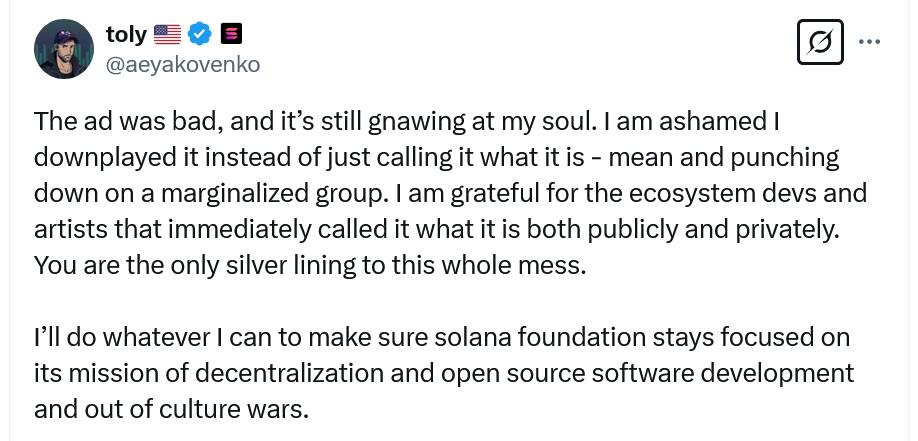In the world of cryptocurrency, few events can stir up conversation quite like a misstep from a prominent figure. Recently, Anatoly Yakovenko, the CEO of Solana Labs, faced significant backlash for a controversial advertisement that aimed to blend American pride with technological innovation. The ad, part of the Solana Accelerate conference promotion, featured a character embodying America in a therapy session discussing thoughts on innovation alongside comments on gender identity.
“The ad was bad, and it’s still gnawing at my soul,”
Yakovenko expressed in a post that followed the strong negative reaction, adding that he regretted his initial downplaying of the situation. He acknowledged its detrimental impact on a marginalized group, showcasing a deeper understanding of the criticism leveled at the ad.
Despite its removal after just nine hours, the ad had already made quite the impression, racking up approximately 1.2 million views and sparking over a thousand comments before it disappeared. Yakovenko praised those within the Solana community who pointed out the messaging issues, emphasizing his commitment to keeping the focus on open-source development and away from cultural wars.
Solana’s official channels, while initially promoting the advertisement, quickly distanced themselves from it as the negative responses mounted. As a result, supportive tweets were deleted, underscoring the internal disagreement on the message being conveyed.
“Solana is for everyone,”
an earlier message from the Solana account, starkly contrasts the sentiments presented in the ad. This incident has reignited discussions about representation in the tech community, with voices like Adam Cochran highlighting the significant contributions of transgender individuals in fields like open-source software and cryptography.
As the dust settles on this event, it serves as a poignant reminder of the diverse audience within the cryptocurrency space and the importance of sensitivity in messaging. The conversation surrounding representation, innovation, and inclusivity continues, reinforcing the need for companies to approach their marketing with care and consideration.
Solana Labs CEO Addresses Controversial Advertisement
Here are the key points regarding Anatoly Yakovenko’s recent statements and the implications of the advertisement that stirred up controversy:
- Ad Controversy: CEO Anatoly Yakovenko publicly criticized the Solana advertisement, acknowledging it as “bad” and detrimental.
- Backlash Response: The ad sparked significant backlash, leading to its deletion within nine hours after it accumulated 1.2 million views and numerous comments.
- Personal Reflection: Yakovenko expressed shame for initially downplaying the ad’s insensitivity towards marginalized groups.
- Community Support: He praised members of the Solana ecosystem for voicing their concerns regarding the controversial message.
- Future Focus: Yakovenko emphasized that this experience will guide Solana’s commitment to open-source software and avoidance of cultural conflicts.
- Ad Content: The ad depicted a therapy session blending themes of innovation and gender identity, which was poorly received.
- Trans Representation: The backlash highlights the significant role of transgender and non-binary individuals in the open-source community and tech innovation.
- Official Silence: Although Yakovenko spoke out, Solana has not released an official comment on the matter, despite the ad’s wide reach.
Impact on Readers: The controversy around the advertisement demonstrates the importance of sensitivity and inclusion in marketing, especially for tech communities. It serves as a reminder for individuals and organizations to consider the diverse backgrounds and identities within their audience, as missteps can lead to significant backlash and damage to reputation.
Analyzing Solana Labs’ Controversial Ad: A Missed Opportunity for Unity
The digital currency landscape is a hotbed of innovation, but it can also foster strife, as evidenced by the recent mishap from Solana Labs. CEO Anatoly Yakovenko’s candid admission regarding the backlash from the “America Is Back – Time to Accelerate” ad showcases both a significant misstep and a crucial learning opportunity for the company. Unlike other tech firms who sometimes rally behind controversial messages to boost engagement, Solana faced a decisive setback, highlighting its vulnerability in navigating complex social issues.
In a market teeming with competition from Ethereum, Cardano, and other blockchain projects, Solana’s willingness to experiment with risky advertising strategies could have been seen as a bold move to differentiate itself. However, the fallout from the ad, which clumsily intertwined patriotism with political discourse on gender identity, reveals a glaring disadvantage: alienating potential supporters. By starkly misjudging audience sentiment, Solana inadvertently reinforced the narrative that tech firms can overlook the voices of marginalized communities, a lesson that rivals might capitalize on to position themselves as more inclusive.
This situation could largely benefit competitor platforms that prioritize diversity and inclusivity in their brand messaging. Companies like Ethereum, which has actively cultivated a reputation for community engagement and openness, can leverage this misstep to attract developers and users turned off by Solana’s insensitivity. On the flip side, Solana’s quick acknowledgment of the error could serve as an example for others, demonstrating the importance of responsiveness in corporate communications.
The fact that Yakovenko recognized the mistake—and articulated his intention to steer Solana back towards its foundational principles of open-source development—highlights an essential characteristic of effective leadership in the tech industry. This creates an opening for Solana to not only mend relationships within its ecosystem but also to pivot towards a more intentional and inclusive brand strategy going forward. However, the damage could linger, especially for those who felt personally targeted by the ad’s messaging. Rebuilding trust will require genuine effort and transparent dialogue, particularly with communities affected by the fallout.
In summary, Solana Labs’ recent controversy serves as a critical reminder of the intricate balance between innovation and social responsibility. While the ad’s fallout presents challenges, it also offers a vital lesson that could redefine how tech companies approach issues of identity, inclusivity, and marketing in the ever-evolving digital space.

















